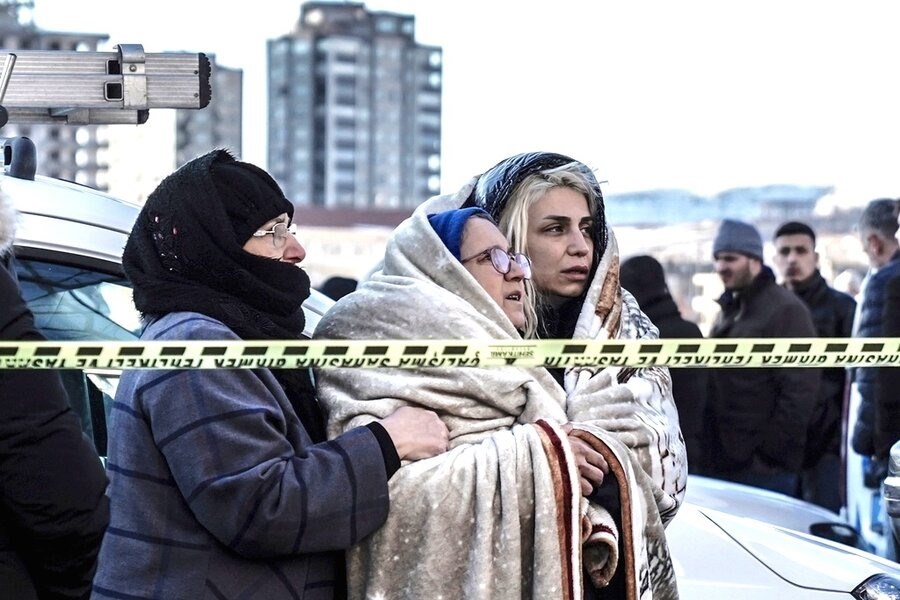REPRINTED WITH PERMISSION FROM THE CHRISTIAN SCIENCE MONITOR
 Women watch emergency teams search for survivors in a destroyed building in Gaziantep, Turkey, Feb. 7. AP
Women watch emergency teams search for survivors in a destroyed building in Gaziantep, Turkey, Feb. 7. AP
February 7, 2023
People in the Turkish city at the epicenter of Monday’s quakes provide a model of inclusion, integration, and compassion.
Within hours after the devastating earthquakes in southern Turkey and northern Syria early Monday, more than 60 nations pledged support. That compassion even reached across enemy lines. Israel has said it would send aid to Syria. Russians and Ukrainians living in Turkey are working together to assist Turkey’s most damaged cities.
The swift international response offers a counterpoint to fears that the world is increasingly divided by conflict and competition. Yet at the earthquake’s epicenter, the Turkish city of Gaziantep, another lesson is on display, one that shows humanity need not be bound by ethnic or sectarian identities.
More than 10,000 years old, Gaziantep is a thriving industrial city of Kurds, Syrians, and Turks – communities that have faced constant division and conflict elsewhere in the region. Over the past decade, the city welcomed half a million Syrians displaced by a civil war. Residents and city officials made a conscious decision to see the migrants as a resource rather than a burden – and as a catalyst for improving services like water, health care, housing, and education for everyone.
That social cohesion is now at work in Gaziantep’s rescue and recovery from the earthquake. The city’s mosques and many civic venues have been opened to everyone. “Municipal workers have been distributing water, bread and warm rice,” writes CNN reporter Eyad Kourdi from the city. Or as the city’s mayor, Fatma Şahin, told the World Urban Forum last June, “We are the guardian of all our residents,” with a special obligation to migrants.
Urban experts have taken note. “Gaziantep addressed an important question: Do refugees cause social, political, and economic destabilization?” wrote Önder Yalçın, the city’s former director of migration, in an essay for the German Marshall Fund. The city concluded that destabilization was the result of poor leadership rather than refugees. That insight led to a strategy to emphasize social justice and human rights.
“We are aiming for social cohesion, because Turkish and Syrian people are going to live together here, and if you only help Syrians, there is going to be tension,” Mr. Yalçın told The Guardian in 2019. “We said: ‘When you help Syrians in the same neighborhoods where Turkish people have the same needs, you have to help them, too.’”
That approach leads to shared uplift. “If inclusion is managed effectively and at all levels of a community, it can create a lot of wealth,” notes Roi Chiti, the coordinator for the Inclusive Cities, Communities of Solidarity project, in a Center for Global Development blog post.
In a region already torn by several conflicts, the earthquakes have compounded existing humanitarian crises. Yet as the recovery and reconstruction begins, leaders in the devastated areas can look to Gaziantep. The mayor, Ms. Şahin, was recently ranked the third-most successful mayor in Turkey in a survey. Cinder blocks may crumble. But a community’s compassion, empathy, and inclusion are less easily shaken.
Related stories
Page created on 2/8/2023 1:03:57 PM
Last edited 2/8/2023 1:11:40 PM
